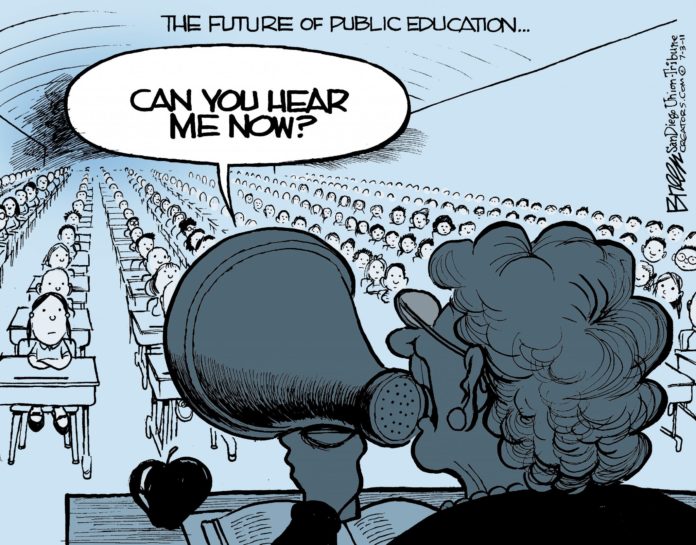A recent education honor society poll asked this loaded question: Which do you think would result in higher student achievement, classes with fewer students and a less effective teacher or classes with more students and a more effective teacher? Note the buzzwords.
The results were predictable; about three times as many respondents voted for more effective teachers. The pollsters didn’t ask, however, how effective a teacher can be in an overcrowded class. Research is clear: classes with less than 18 students give the best results. But loaded questions trump research.
The best teacher can only answer so many questions, correct so many essays, and get to know so many students well enough to respond to individual needs. It is this individualization that makes teachers most effective, and it is almost impossible in mega classes.
Then there are the proponents of replacing teachers with online classes. Of course, there are teachers at the other end of the terminal who are supposed to respond to students, but students speak in all sorts of ways.
A few years ago, I was telling my students that we would be publishing a chapbook of student work. Immediately I saw the stiff back and creased brow of a student in the back of the room, a boy on an IEP for reading disability.
“We will do a lot of writing,” I said, “but don’t worry about the spelling and grammar. We will work on what you have to say first then we will fix the mechanics.”
His shoulders relaxed, and he settled back into his chair. I got some of my best poems and stories from this student because I had read his body language and responded to his worries. Can an online teacher do that?
And what’s with all the negative statements in the comments section of online articles! “So another teacher gets fired,” one said. “Good.”
I can only imagine what that student’s experiences were in school, and I mourn for him. But without teachers, there would be no doctors, no plumbers, no carpenters. There would be no books, but there would also be no movies. Someone has to write those stories and someone has to publish or film them.
There are good teachers and bad teachers; I’ve known both. The majority work hard, care about the students, study to improve themselves, and perform miracles. The others, and badly worded poll questions, give good teachers a bad name.
– Sharon Martin lives in Oilton, OK and is a regular contributor to The Oklahoma Observer









